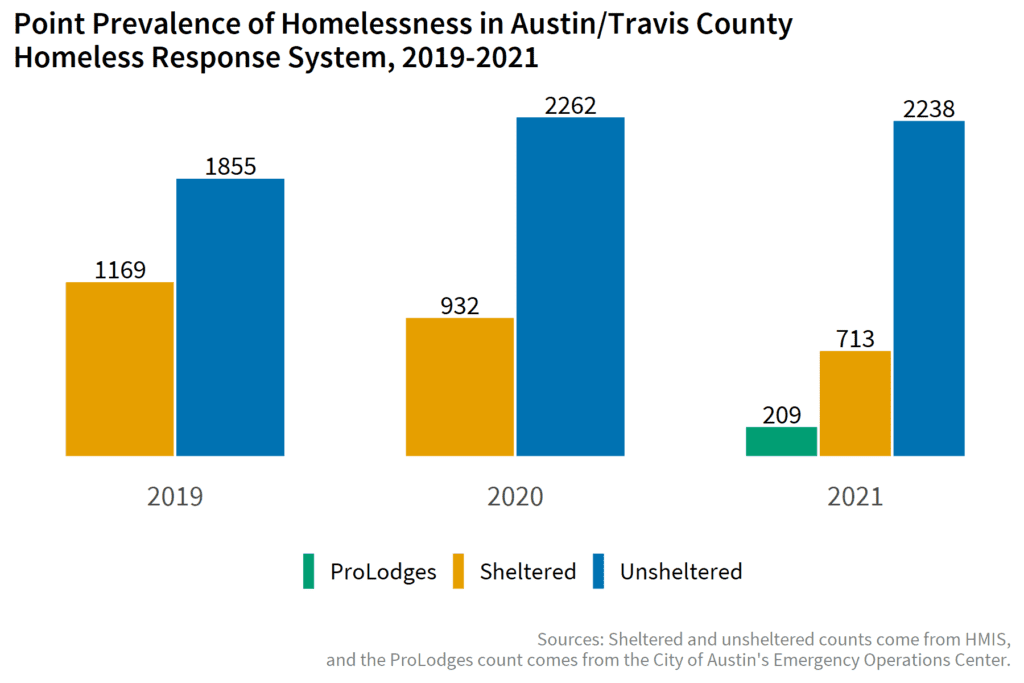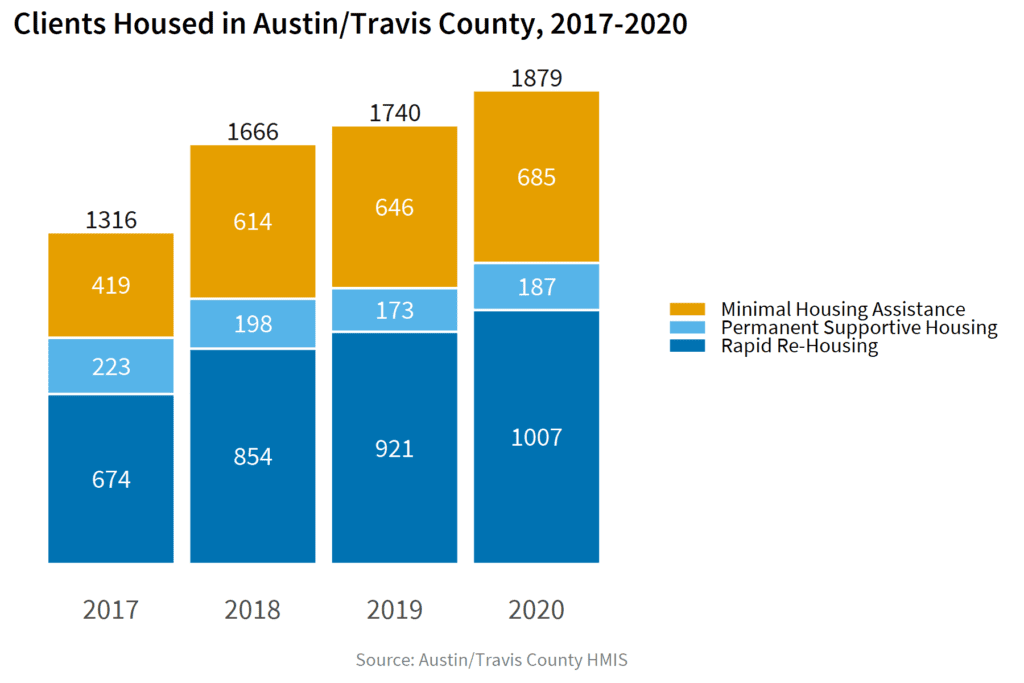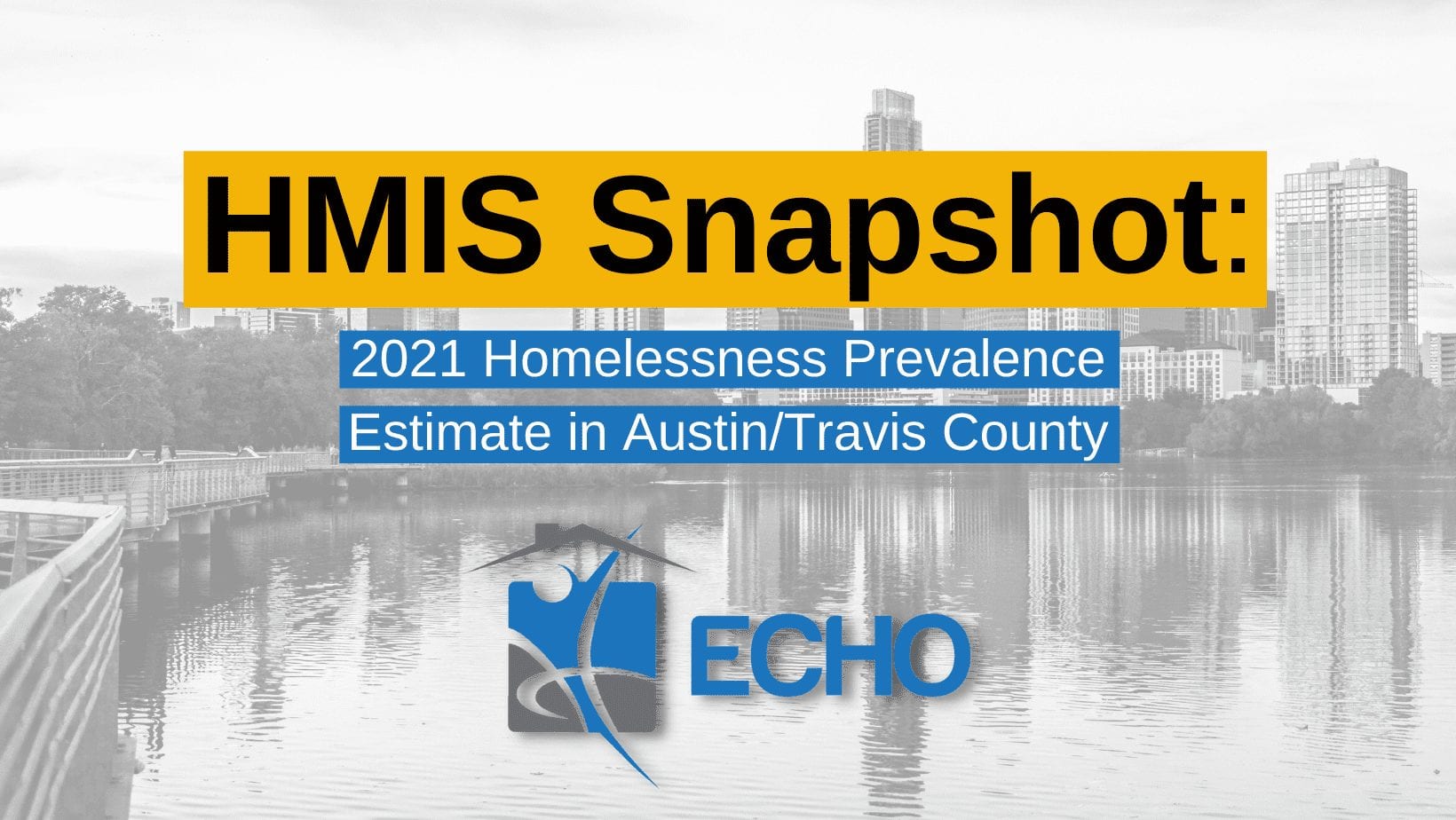HMIS Snapshot: 2021 Homelessness Prevalence Estimate
PRESS RELEASE
AUSTIN, Texas (May 21, 2021) – The Ending Community Homelessness Coalition (ECHO) estimates that on a single day in 2021, 3,160 people experienced homelessness in Austin/Travis County. This includes 2,238 people living unsheltered in tents, cars, abandoned buildings, and other places not meant for human habitation, as well as 922 people either in traditional congregate shelter or temporary non-congregate shelter in the form of Protective Lodges (ProLodges) set up by the City of Austin in response to the COVID-19 pandemic.
ECHO was exempted from a traditional in-person Point in Time (PIT) Count this year to prevent the spread of COVID-19, and our Research and Evaluation (R&E) team developed and piloted a new method of estimating a single-day snapshot from the Coordinated Entry system maintained in the Homeless Management Information System (HMIS), which tracks person-level needs over time. ECHO believes this is the best estimate yet of the true need in our community on a given day.

Due to extensive differences in methodologies between the two estimates, this year’s results cannot and should not be compared to past or future PIT Counts. To use an analogy, the differences between this method and the traditional PIT Count method are akin to the differences between visually counting as many cars as possible in Travis County for a few hours on a single day in 2020, pulling DMV records for cars registered in Travis County on a single day in 2021, and comparing the two to determine how the number of cars has changed year to year. An in-person count is likely to be less comprehensive, but may identify cars that are not registered, whereas the DMV records would provide more detail, but do not account for cars that aren’t registered.
This new HMIS Snapshot methodology, described in detail in the source document [PDF], will allow ECHO’s R&E Team to provide regular updates on single-day prevalence throughout the year rather than relying on data recorded only once a year in January. While these numbers cannot be compared to in-person PIT Count totals, ECHO also applied this new HMIS methodology to a single day in January in 2020 and in 2019 to analyze trends year to year. According to this analysis, the 2021 estimate was 1.1% lower than the 2020 estimate overall. Unsheltered homelessness decreased by 1.1%, and sheltered homelessness decreased 1.1%. (Note:While ProLodges are considered non-congregate shelter by homeless service providers, they are not technically classified as “shelter” under U.S. Department of Housing and Urban Development guidelines. Using HUD definitions, sheltered homelessness fell 23.5%. However, due to the nature of these facilities, ECHO considers these individuals “sheltered” for the purposes of this report.)
This method shows an increase of 4.5% in the overall unhoused population seeking services through the Homelessness Response System from 2019 to 2021, including a 21.1% decrease in the population of people experiencing sheltered homelessness (ProLodges included) and a 20.6% increase in the population of people experiencing unsheltered homelessness. Meanwhile the rate of homelessness per capita has remained fairly constant at around 0.24% since 2019. As indicated in 2020, ECHO believes this shift from sheltered to unsheltered homelessness is the result of the correct reclassification of programs from emergency shelter to transitional housing between 2019 and 2020, as well as a shift by two shelters toward a housing-focused model that provides more comprehensive case management but reduces overall capacity.
Increased Visibility Due to COVID-19
During the last year, many Austinites have observed an increase in the visibility of unsheltered homelessness. These data show this is likely due to measures taken to protect unhoused people from the virus rather than a substantial increase in need. For example, service providers distributed tents and other camping supplies to encourage people to isolate as shelters reduced capacity to allow for social distancing. Additionally, the City of Austin followed CDC guidelines not to disrupt encampments, including in places like parks where there are prohibitions against encampments, to prevent the spread of the virus; this allowed people to stay in one place longer without risking losing their possessions. The Eating Apart Together (EAT) Initiative also encouraged social distancing and allowed people to remain in one place, delivering 1 million meals so far directly to unsheltered people.
“When taken together, these health and safety measures increase the visibility of homelessness in public places, but our data indicate this visibility is not reflective of a rise in the number of Austinites who are experiencing homelessness,” said Akram Al-Turk, ECHO’s Director of Research and Evaluation. “Economic factors resulting from the pandemic, including a significant drop in employment among low-wage workers, might very well lead to an increase in people experiencing homelessness, but it will likely be months or years until we see the full effects of this financial crisis.”

These data underscore the need to scale up permanent housing resources in our community to provide everyone with a stable foundation to meet their basic needs and build wellbeing. Our community added 505 permanent housing beds in 2020, and ECHO’s community partners housed 1,879 people, an increase of 8% from the year before and a 43% increase since 2017. However, because rising rents, stagnant wages, and other economic factors will continue to jeopardize our neighbors’ stability, we must continue to pursue strategic investments and partnerships to make housing a human right for everyone in Austin.
“No one should be forced to live outside, and our community must meet the scale of the need with the right scale of the solution,” said ECHO Executive Director Matt Mollica. “Austin is at an inflection point, and there is a clear path forward to a healthier, more equitable community. It’s up to all of us to meet this opportunity and to fight for access to quality, affordable housing as a human right.”
Why This New Methodology
Due to health risks associated with the ongoing pandemic, ECHO submitted and received an exception to the 2021 unsheltered PIT Count from the U.S. Department of Housing and Urban Development in late 2020 for reasons specified in the source document [PDF].
“It simply wasn’t safe to encourage many hundreds of people to gather together and interact with a population that is particularly at risk of COVID-19 complications and death, but it was still important for us to gather and analyze data to meet the needs of our unhoused neighbors and monitor our progress as a system,” said Sarah Duzinski, ECHO’s Vice President of Quality Assurance. “ECHO’s goal is to continuously improve the way we collect and analyze data, and this new method is one we’re confident we can replicate throughout the year to better communicate the ever-changing needs of people experiencing homelessness.”
ECHO plans to use this new methodology to provide monthly snapshots to identify trends and changes in homelessness in our community. We encourage reporters and community members to contact ECHO’s communications team for the latest data when in need of a snapshot of homelessness. ECHO will continue to conduct a HUD-required PIT Count in future years to distribute needed supplies to people experiencing homelessness, engage volunteers in supporting their unhoused neighbors, and assess ongoing needs within the community that may not be captured through HMIS.
“HMIS is a critical tool to understand the needs of people experiencing homelessness, but it’s just one of many tools we use as a community to provide resources and support to our unhoused neighbors,” said HMIS Director Whitney Bright. “Homelessness is fluid – people lose and regain stability every day – so we have to use every tool at our disposal to support people experiencing this ongoing trauma.”
Other Key Findings
In addition to the estimate of the total number of people experiencing homelessness, ECHO’s R&E Team examined a wide cross-section of subpopulations to identify trends and help focus attention on specific areas of need in our community.
- Black people, people with disabilities, and veterans are overrepresented in the population of people experiencing homelessness.
- Black people comprise 37% of the population of people experiencing homelessness, but only about 8% of the Travis County population. This disproportionality has not changed significantly year to year, indicating there is much work still to do to combat systemic racism in housing, healthcare, employment, education, and criminal justice to reduce the inequities present in our population. To combat these inequities in our Homelessness Response System, Austin/Travis County was part of the first-ever HUD Racial Equity Demonstration Project to find and fix disparities in how our community connects people to resources.
- Of people experiencing homelessness, 69% report living with a disability, while 8% of the Travis County population reports the same. People with disabilities are more likely to be unsheltered (71%) than sheltered (51%), except in the case of ProLodges, where 90% of people report living with a disability.
- Veterans make up 9% of the population of people experiencing homelessness and 5% of the general population. Veterans are particularly vulnerable to housing instability and experience higher rates of returns to homelessness than the general population, indicating a need for consistent commitments to supporting this population through permanent housing resources.
- ProLodge residents are more likely (67%) to have visited the emergency room or been hospitalized in the last six months than people who are sheltered (51%) or unsheltered (62%). Regardless, these data reinforce that ER visits are common for people experiencing homelessness, which adds financial strain to public systems that diminishes when a person is stably housed. (See Integral Care’s analysis of Terrace at Oak Springs residents for more information.)
- Half of people experiencing homelessness in Austin/Travis County are chronically homeless, meaning they have experienced a single episode of homelessness for more than a year or at least four episodes of homelessness totaling 12 months in the last three years. This high proportion of people who experience chronic homelessness indicates the lack of housing opportunities and the need to scale up resources to connect people with permanent housing so they can begin to rebuild stability.
2020 and Future System Successes
- The City of Austin purchased two hotels to convert into bridge and permanent housing for people experiencing homelessness in 2020, adding two more thus far in 2021. Each of these properties adds dozens of new units to the Homelessness Response System.
- In 2020, SAFE provided Rapid Re-Housing services to 170 youth and adult survivors of violence and abuse, a 48% increase over 2019.
- In 2020, LifeWorks assisted more than 283 youth exit homelessness. Since the 2018 concerted effort to end youth homelessness, LifeWorks and partners have housed more than 800 youth.
- In 2020, Family Eldercare permanently housed 125 older adults and distributed over $1.5 million to support housing stability and prevent homelessness for vulnerable populations. Family Eldercare also assisted 1,058 individuals with benefits enrollment for a total value of $2,030,553 over the last year.
- In 2020, The Other Ones Foundation housed 25 people, removed 467,810 pounds of trash from green spaces in Austin, and paid out $430,805 in earned income to people experiencing homelessness.
- The Salvation Army began using a 5-year grant from the Bezos Day One Fund to provide Housing Assistance, Child-Centric Services, COVID 19 and emergency shelter operations needs for families experiencing homelessness at the Salvation Army Rathgeber Center and the Austin Shelter for Women and Children. During the last calendar year, over 560 children were sheltered. The official slogan of the $2.5 million effort to enhance our community response to family homelessness is “No Child Sleeps Outside!”
- In 2020, Integral Care completed 163 intakes or assessments for mental health services through the 3,000 Oak Springs Clinic for individuals at the ProLodges and housed a total of 142 people.
- Integral Care analyzed data from Terrace at Oak Springs, a Permanent Supportive Housing development that uses a Housing First model, comparing the six months after move-in to the six months before move-in for 50 people and found over a 70% reduction in arrests, over a 60% reduction in medical inpatient admissions, and an almost 90% reduction in medical inpatient days. This led to public costs savings of more than $336,000 over the course of six months.
- Front Steps reduced the number of people staying nightly in shelter to proactively combat the transmission of COVID-19 and connected additional clients to one of the five ProLodges, where, with Front Steps’ support, the daily average of people served reached 305. These COVID-19 precautions kept people sheltered and safe and reduced the number of positive cases among people experiencing homelessness to below national averages.
- The Eating Apart Together (EAT) Initiative, a City of Austin-led partnership to deliver shelf-stable and prepared meals directly to encampments across Travis County during the pandemic, delivered more than 500,000 meals in 2020 and will reach 1 million meals delivered in May of 2021.
- COVID-19 Protective Lodges (ProLodges) connected 164 people to permanent housing and 13 to temporary housing as of January 28, 2021. That number has since increased to more than 200.
- ECHO is helping coordinate $15.5M of COVID-19 Emergency Solutions Grant (ESG-CV) funds to serve at least 488 households between 2020 and 2022.
- ECHO and the Austin Justice Coalition launched the How to House campaign in December 2020 to form new partnerships with property owners and managers and advance anti-racist housing policies and practices. ECHO has facilitated 88 initial move-ins since the start of the campaign.
- The Summit to address unsheltered homelessness was launched in March of 2021. Partners from the Summit have committed to housing an additional 3,000 people in the next 3 years.
- New federal housing vouchers are slated to support people experiencing homelessness, including 242 Emergency Housing Vouchers from the American Rescue Plan Act, 750 Housing Choice Vouchers over the next 5 years, and 50 Mainstream Vouchers for non-elderly disabled households.
- Caritas of Austin will launch the Espero Austin at Rutland, adding 172 units by December 2022.
- The At Home Initiative, a multi-partner effort, is a collaborative project being funded by the St. David’s Foundation, Seton Ascension, Travis County, the City of Austin, the Department of Housing and Urban Development, and the Department of Justice and will provide housing and supportive services for 250 individuals in Permanent Supportive Housing.
- Foundation Communities opened Waterloo Terrace (132 affordable housing units) in December 2020.
- Mobile Loaves and Fishes will add 1,400 units in the next 10 years.


